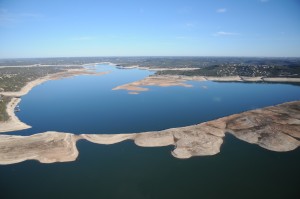State Tells River Authority Water Plan Needs More Review

Photo by LCRA
The extreme drought and 2011 releases to farmers lowered levels in Lakes Buchanan and Travis (pictured) in Central Texas. Now a state agency is saying more study is needed into how the reservoirs are managed.
In the ongoing battle over water in the Highland Lakes of Central Texas, the City of Austin and lake residents and businesses scored something of a victory this week when the state told the Lower Colorado River Authority (LCRA) that its water management plan will need more review.
The LCRA manages the water in the Highland Lakes, including the main reservoirs of Buchanan and Travis, which are vital sources of water for Austin. Until 2012, those reservoirs also provided massive amounts of water for rice farmers downstream. In 2011 — the driest year in Texas’ recorded history — the LCRA, under its existing management plan, released three times as much water to the rice farmers from the lakes as Austin used from them that entire year. (Last year and this year, under emergency plans, the LCRA cut off most rice farmers from water for irrigation.)
In 2012, the LCRA came up with an updated plan that would have helped prevent such releases of water during times of extreme drought. But it had to be approved by the state environmental agency, the Texas Commission on Environmental Quality (TCEQ). After reviewing the proposed plan and hearing opposition from the public as well as some prominent politicians, the state agency is saying that the water management plan needs more work. Specifically, it needs to reflect the drier times affecting Texas and include more recent data.
“Based on public comment and continuing drought conditions, I have determined that further evaluation of your application is appropriate in order to take into account information raised in the public comments, such as recent streamflow data,” TCEQ Executive Director Zak Covar wrote in a letter to the LCRA yesterday.
It will take close to a year for the state to collect and compile more data and model it into future projections, the letter says. That means the LCRA’s 2012 water plan may not go into effect until well into 2014.
State approval of LCRA water plans has been a requirement since 1988. This is the first time the state has had to conduct additional review.
State Senators Troy Fraser, R-Horsehoe Bay, and Kirk Watson, D-Austin, have called for more protections for municipal supplies from the LCRA. They tried to curb some of the LCRA’s authority this legislative session, without much success. The two are pleased that the state will now closely examine the LCRA’s planning process.
“For the past two years, the LCRA has had emergency orders that would still be needed if the proposed plan was in place,” Fraser said in a joint statement with Watson. “Clearly this plan is flawed as it does not accomplish the purpose for which it is intended – protecting firm water customers during a repeat of the drought of record.”
The LCRA says it will cooperate with the extended review. It adds that if the drought continues, it could enact an emergency water plan for a third year in a row — with a possible cutoff of water to rice farmers downstream.

